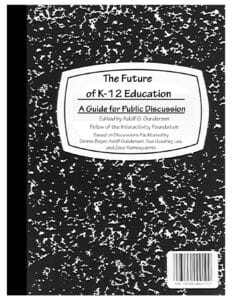This discussion guide invites us to explore  the nature of K-12 education and learning by asking a number of key, foundational questions. How might education help individuals gain useful life skills as well as marketable skills for employment? How might education support economic growth and development for society at large, through shared morals and ethics and civic education? Which aspects of education might be most important and why? How do parents and family, peers, teachers, individual genetics, funding, broader societal setting, school organization, teaching methods, support or undermine the effectiveness of K-12 education? How might public policy be used to affect positively these contributing factors? Who and how should we govern and administer K-12 education? Experts, parents, teachers, local, state, federal, citizens generally, etc.? Thls discussion guide offers five different paths, or policy possibilities, for further discussion and exploration.
the nature of K-12 education and learning by asking a number of key, foundational questions. How might education help individuals gain useful life skills as well as marketable skills for employment? How might education support economic growth and development for society at large, through shared morals and ethics and civic education? Which aspects of education might be most important and why? How do parents and family, peers, teachers, individual genetics, funding, broader societal setting, school organization, teaching methods, support or undermine the effectiveness of K-12 education? How might public policy be used to affect positively these contributing factors? Who and how should we govern and administer K-12 education? Experts, parents, teachers, local, state, federal, citizens generally, etc.? Thls discussion guide offers five different paths, or policy possibilities, for further discussion and exploration.



